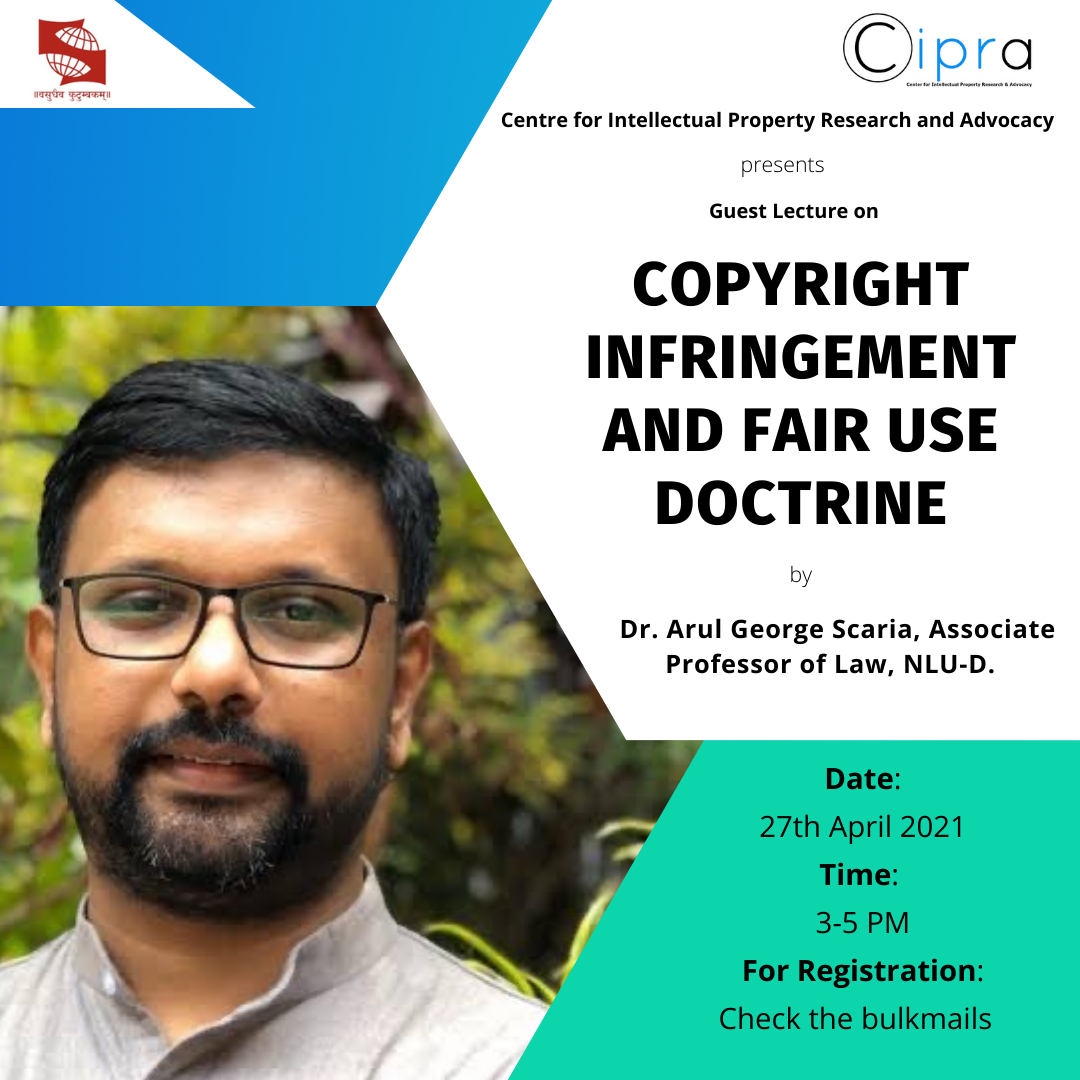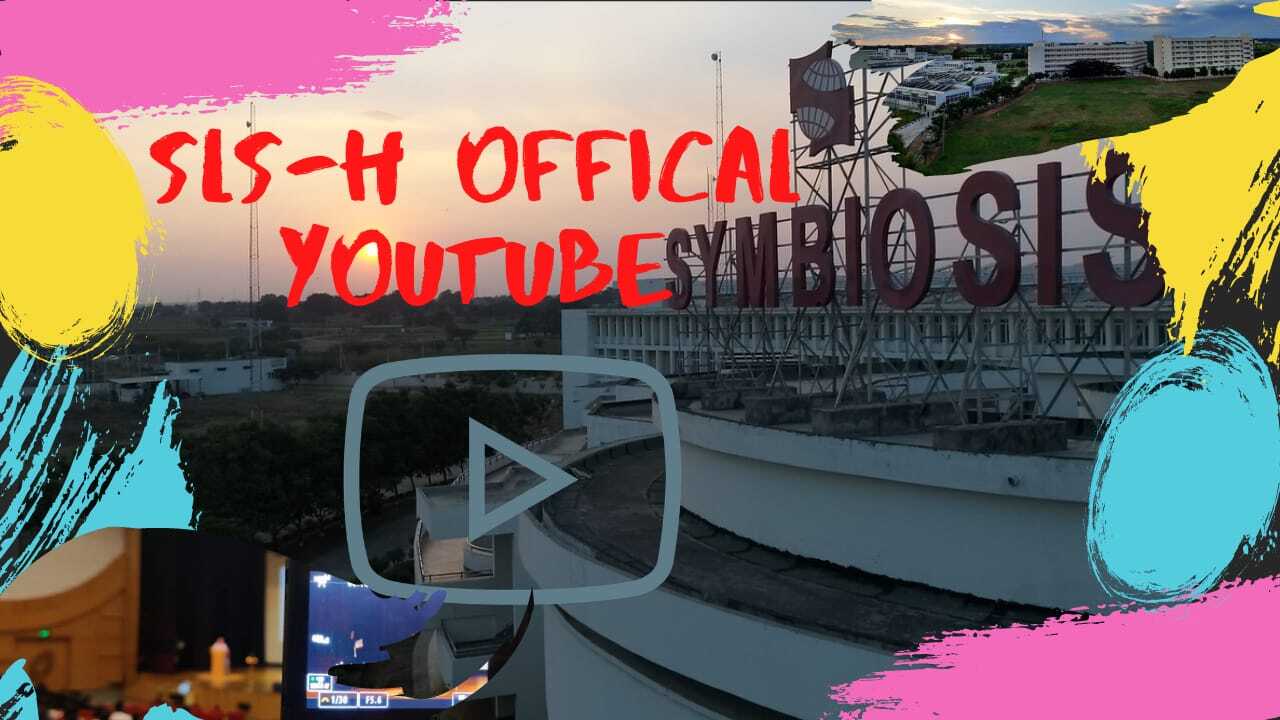
GUEST LECTURE ON COPYRIGHT INFRINGEMENT AND FAIR USE DOCTRINE DR. ARUL GEORGE SCARIA – WORLD IP DAY CELEBRATIONS BY THE CENTRE FOR INTELLECTUAL RESEARCH & ADVOCACY
ABOUT THE GUEST LECTURE
The Guest Lecture was organized by the Centre for Intellectual Property Research & Advocacy (hereinafter referred to as ‘CIPRA’) under the aegis of Symbiosis Law School, Hyderabad (SLS-H) on April 27th, 2021. The event was organized virtually through the virtual medium of Microsoft Teams. The event was primarily organized to focus on promoting and stimulating detailed discussion in relevance to intellectual property (hereinafter referred to as ‘IP’) and to celebrate “World IP Day”.

ABOUT THE SPEAKER
Dr. Arul George Scaria: Mr. Arul is an Associate Professor of Law and Co-Director of the Centre for Innovation, Intellectual Property, and Competition (CIIPC). He is also an Affiliate Faculty of the CopyrightX program, which is a course offered under the auspices of the Harvard Law School, the HarvardX distance-learning initiative, and the Berkman Klein Center for Internet and Society, Harvard University. His key areas of interest and specialization are innovation, intellectual property rights, and competition law.
Mr. Arul did his doctoral research at the International Max Planck Research School for Competition and Innovation. Sir has completed his post-doctoral research at the Catholic University of Louvain Belgium, focussing on the issue of open access to large-scale research data and he was part of different EU-funded projects. Mr. Arul has also worked as a CSIR-NIF Fellow in the IP management division of the National Innovation Foundation of India.
Mr. Arul has two single-authored books to his credit – Piracy in the Indian Film Industry: Copyright and Cultural Consonance and Ambush Marketing: Game within a Game. Sir was a member of the advisory committee constituted by the (NCERT), India, in 2014 for addressing the copyright license issues. He is currently a member of the IPR expert group constituted by the Department of Science and Technology, Government of Rajasthan. He is also the co-chair of a thematic group constituted by the Principal Scientific Adviser to the Prime Minister and the Department of Science and Technology, Government of India.
AIMS AND OBJECTIVES OF THE GUEST LECTURE
The Symposium was organized and carried out to achieve the following objectives
- The central objective of this event is to offer exposure and experience about intellectual property regimes to students and academicians who are IP enthusiasts, to foster and cultivate their interest in the same.
- The virtual event was conducted to bring awareness to intellectual property, particularly Copyrights.
- The event sought to commemorate the day recognized globally to celebrate IPR and IP creations.

OUTCOME OF THE EVENT
The Event by a welcome address by Miss Sreeja, a member of CIPRA followed by a brief introduction to IP Day and Mr. Arul.
The lecture began with Mr. Arul addressing the audience and asking the students what they under understand by copyright. He noticed that everyone mentioned that they believe copyright strives to protect original work. He stated that there is no fixed definition for copyright and it is omnipresent and all around us. It is a branch of law regulating the use and creation of work.
He moved on to state that it is the Judiciary, through the Courts that determine during litigation if the creation is a copyright or not because there are excluded matters that don’t come under copyright as well. To further provide a better creation, he mentioned case laws and landmark judgments that elaborated upon how determining if creation is a copyright or not has been adjudged.
Moving on, Mr. Arul highlighted how Copyrights are territorial in nature. It is merely the set of rights that may be idiosyncratic and different in each jurisdiction. Copyrights consist of moral, economic, and non-economic rights. There persists Right to Attribution and Right to Integrity. The protection of moral rights depends upon whether a particular state is a common law nation or a civil law nation as well. He emphasized that India took the inherent decision to provide mechanisms for the protection of moral rights.
To induce knowledge through practical knowledge, Mr. Arul showcased certain videos on YouTube to the audience to provide a better understanding of Copyrights. He then proceeded with the mechanism through which copyright owners can address complaints about work uploaded on intermediaries and their liability under the Information Technology Act, 2000. In the same aspect, some of the recent cases such as the copyright of the Kerala Temple’s music being infringed online were also discussed to explain the application of the concept.
The participants were then asked to name the possible exceptions to copyright infringement. Based on their answers, Mr. Arul then clarified the common misconceptions of one of the exceptions of fair use and then elaborated on the exceptions covered under the Copyrights Act, 1957. Before concluding the session, an overview of the International Agreements on copyrights was also discussed.

Lastly, the guest lecture was concluded with a vote of thanks sincerely delivered by Mrs. Dhanya K. A.


